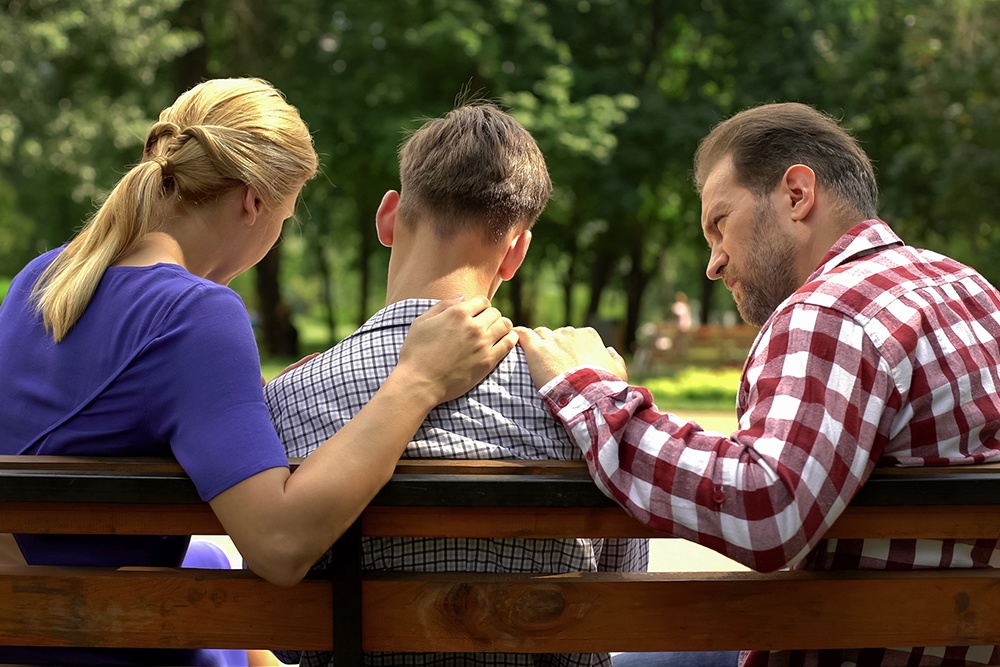It’s a phone call we get nearly every day at North Shore Child & Family Guidance Center: A parent tells us their son or daughter seems very depressed and anxious. They worry that their child may be at risk for self-harm or even suicide.
“Families are in desperate need of help because their tweens and teens are expressing suicidal feelings,” says Regina Barros-Rivera, Associate Executive Director of the Guidance Center. “And with the isolation and heightened anxiety brought on by the COVID-19 pandemic, it’s created an even more dangerous situation. Kids have lost their school and social connections, and many families have experienced the loss of loved ones. As a result of being secluded in an unstable home, children may also be exposed to domestic violence, substance abuse, neglect or other forms of violence.”
Sadly, suicide among young people isn’t a new problem on Long Island or across our nation. According to the U.S. Centers for Disease Control and Prevention, suicide is the secondleading cause of death for ages 10-24, with more teenagers and young adults dying from suicide than from cancer, heart disease, birth defects, stroke, pneumonia, influenza and lung disease combined.
For all of our 67-year history, the Guidance Center has been helping children and families in crisis, and we are increasing our efforts with a new program designed to prevent suicide and suicide attempts.
Today, on World Suicide Prevention Awareness Day, North Shore Child & Family Guidance Center is announcing the launch of the Douglas S. Feldman Suicide Prevention Project, an expansive initiative that aims to tackle the epidemic of suicide among young people. The program is made possible by a generous gift from Donald and Ellen Feldman in memory of their son.
Elissa Smilowitz, who heads up the Triage & Emergency program at the Guidance Center, has been treating suicidal youngsters for several decades. She will also be providing leadership for the Douglas S. Feldman Suicide Prevention Project.
“We’ve always seen emergency cases within 24 to 48 hours, but with this new initiative, we will be expanding our efforts substantially,” says Smilowitz. With the Douglas S. Feldman Suicide Prevention Project, the Guidance Center will continue to address high-risk cases with a thorough evaluation for suicide risk; multiple sessions of individual, group and family therapy each week; and an individualized treatment plan that focuses on safety strategies and healthy coping skills.
The Guidance Center will now offer services that will decrease the prevalence of suicidal thinking and actions in our children and teens through educational forums, both face-to-face and with webinars. In addition, we will launch a suicide survivors’ support group for those who suffer this tragic loss.
Andrew Malekoff, Executive Director of the Guidance Center, says, “We are grateful to the Feldmans for supporting the development of a suicide prevention initiative that will enhance our ability to reach young people who may see no way out from the despair they are feeling—especially during a time of unprecedented risk, deep divisions in our nation and a global pandemic.”
He adds, “Join us in spreading the word to schools, community organizations and friends about the Douglas S. Feldman Suicide Prevention Project. Information is power, and this program can save lives.”
Donations to support the lifesaving work of the Douglas S. Feldman Suicide Prevention Project can be made on the Guidance Center’s website at www.northshorechildguidance.org/donate or by calling (516) 626-1971, ext. 320.
If you or a member of your family is in crisis, call North Shore Child & Family Guidance Center at (516) 626-1971. You can also call the toll-free National Suicide Prevention Lifeline at 1-800-273-TALK (8255), available 24 hours a day, 7 days a week.
Sources:
https://webappa.cdc.gov/sasweb/ncipc/leadcause.html
Knowing the Signs
Both children and teens are at risk of depression and suicide when they experience traumatic events in their lives, such as divorce, death of a loved one, abuse or illness. Today, the stresses of the pandemic compound that risk.
Parents must acknowledge that the risk of suicide is real and that it’s very dangerous to view their child or teen’s behavior as a normal part of adolescent melodrama.
Here are some of the warning signs that a child or teen might be suicidal, from the Mayo Clinic:
- Talking or writing about suicide — for example, making statements such as “I’m going to kill myself,” or “I won’t be a problem for you much longer”
- Withdrawing from social contact
- Having mood swings
- Increasing use of alcohol or drugs
- Feeling trapped or hopeless about a situation
- Changing normal routine, including eating or sleeping patterns
- Doing risky or self-destructive things
- Giving away belongings when there is no other logical explanation for why this is being done
- Developing personality changes or being severely anxious or agitated when experiencing some of the warning signs listed above
So, what do you do if you suspect your child or teen may be suicidal? The first step is to consult a mental health professional. The Guidance Center team will assess if the situation appears urgent and will make an appointment to see the child within 24 to 48 hours (if it’s deemed extremely urgent, we advise you go to the Emergency Room). We can be reached at (516) 626-1971, or via email at intake@northshorechildguidance.org.It’s very important that you communicate your concern to your child in a loving, non-judgmental way, says Elissa Smilowitz, who heads up the Guidance Center’s new Douglas S. Feldman Suicide Prevention Project. “Talking about suicide will not make your child more likely to act upon it,” she says. “The opposite is true. Also, let them know that you believe that getting help is not a weakness, but rather shows their strength.”














